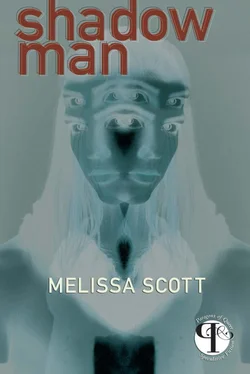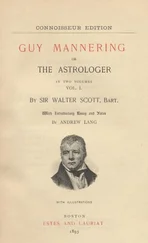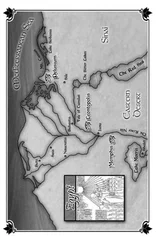“That’s crazy,” Tatian said.
“No crazier than anything else on this planet,” Isabon answered. “And he’s got support, Tatian. I had to send one of my assistants to Redlands last month because they were so uncomfortable dealing with me. I hate to say it, but the IDCA might be right. This is not the time to give him any excuses.”
Tatian sat silent for a moment. He still had trouble understanding how Harans could deny the existence of three of the sexes, when mems, fems, and herms walked past them every day, a full quarter of the population. But then, he’d once had a polite, slightly mad conversation with an old vieuvant , who had told him quite sincerely that the story about the five sexes being the result of hyperlumin-induced mutation was a lie, or at best a misperception, and that all that was really required to bring humanity back to its proper two-gendered state was to stop coddling these people and force them to make up their minds what they really were.
“Redlands must’ve loved dealing with an assistant,” he said aloud.
Isabon smiled, showing teeth. “I told them, they could deal with me directly, or with my assistant, who would not have the authority to offer more than the pre-set contract. They took the assistant and the contract. I can live with the insult when it saves me that much money.”
“Idiots,” Shraga said. He would have said more, but Isabon leaned forward.
“So, Tatya, what do you hear about labor trouble in Pensemare?”
“We don’t do business on the Westland,” Tatian answered, with perfect truth. “All I’ve heard is that the Donavie are going to file a protest.”
“Like it would do them any good,” Shraga said.
Tatian poured himself a second cup of wine, letting the gossip wash over him. He had gotten what he had come for—was willing to pay for the information with whatever he could contribute to the conversation. His heart wasn’t really in it, however, his mind occupied with the upcoming conversation with the Old Dame. If Isabon said he should do what the IDCA wanted, he should probably listen to %er—but Warreven’s opinion had to carry some weight, too, maybe more weight than oers. He would put both opinions to the Old Dame, he thought, let %er make the final decision, but he wanted this contract.
By the time he left Voska’s, it was late enough that he called a rover to drive him back to the office in the Estrange. He paid the driver, a skinny man in cheap flaxen gauze, fifteen grams in metal to wait in the parking alley behind NAPD’s section of the building, and went inside, feeling slightly guilty. It was uncomfortable being this much richer than the general population; even on Antigone, his last station before Hara, he hadn’t felt so out of sync with the rest of the world.
Derebought had left the databutton on his desk, along with a print of her first-run results. Even allowing for error and misunderstanding, and the inevitable shifts in demand and price, the total was enormous. Tatian refolded the papers and set them aside as carefully as if they held the harvest itself. He had underestimated by almost two million. If they took the contract, NAPD would nearly double its profits. Or more.
He flicked the external switch to restart his system, waiting in the silence of the empty building while the machines whirred to life. When the desktop screen lit, a bright orange message reminded him that it was less than an hour to his scheduled conference with Masani, and he fiddled with the shadowscreen to invoke the comm management program. He checked the parameters—all as they should be, just the same as they had been the last time—and flipped the program to standby while he went over Derebought’s figures a final time. Even at their most conservative— improbably, impossibly conservative , he thought, though superstitiously he would never have said that aloud—the profits remained worth the risk. He would warn Masani of Valmy’s and Jhirad’s visit, of course, and their threat—and Isabon’s warning, δer suspicion that they might be right—but he couldn’t imagine turning down this chance. And the Old Dame had never refused a challenge in δer life.
The system chimed then, signaling the preliminary signals from the port. Tatian recalled the communications program and waited while it matched channels and input/output checks. Finally, the screen cleared, displaying the familiar codes of a transsystem link, and the wallscreen opened. Masani looked out at him, expressionless, a tall fem, raw-boned, with harsh lines from the hard weather on a dozen different planets and dark, farsighted eyes. The visuals were only fair, static hazing the edges of the screen, haloing the central images with little rainbows, but the audio was much better, Masani’s voice nearly as clear as on a transcontinental linkup. δe listened to his summary, demanded a copy of the preliminary assessment and whatever else Derebought came up with on later runs, and then fixed him with δer fierce stare.
“So everything’s wonderful, except that the new seraaliste wants Reiss to make a report, sorry, a court statement, that the IDCA has explicitly told you to kill.”
“Yes.” Tatian watched the image warily, δer face and moving hands haloed by rainbow static. He wanted this contract, he realized suddenly, wanted it more than was entirely reasonable—but enthusiasm was appropriate, he told himself, when there was this much money involved.
“And the IDCA wants to kill Reiss’s statement because Temelathe asked them to get involved, and Temelathe wants it killed— why?”
“I don’t know for certain. My best guess—” Tatian spread his own hands, deliberately scaling the gesture to the limits of the comm package, repeated what he’d said before. “From what Valmy and Jhirad said, I think Warreven’s partners want to use this case to force a general discussion of trade. And that means gender law as well, how many sexes there actually are. None of the mesnie s are real comfortable with that, and Tendlathe, who’s a bit of a nut case, as far as I can tell, is working on them to keep things just the way they are.”
Masani’s mouth twisted. “And Tendlathe is confirmed as Temelathe’s heir?”
“Yes,” Tatian said again.
δe snorted. “But Warreven thinks he doesn’t really have the support.” δe looked away then, expression suddenly sad. “I remember when I first came to Hara, everyone assumed I’d do trade, because I’m a fem and I had my own company. Then the indigenes decided I was a woman, so I spent about ninety-seven kilohours, eight local years, having to explain myself to everyone.” δe shook δer head, shook δerself back to the matter at hand. “All right, I don’t like trade, and I don’t have a problem with NAPD being known to be involved in this case if it’s meant to break trade. Temelathe knows where I stand on that. But I especially don’t like the IDCA telling me what I can and can’t do when I’m not breaking any laws. So. Does this Warreven really have this much to offer?”
“The sea-harvest has been very, very good this year,” Tatian answered. “There may be—hell, there will be some exaggeration, either in the grade or in the total quantity available, but we’ve already factored that into the estimates. The seraalistes don’t dare play too fast and loose with the numbers, not if they expect to keep doing business with us.”
“Certainly,” Masani agreed, with a slight, unpleasant smile, and Tatian remembered too late that δe had traded on Hara for ten years. “But does your Warreven know this?”
That could give me nightmares if I let it, Tatian thought. He said, “Yes. I think 3e’s more knowledgeable than 3e lets on.”
“Not too much more, I hope,” the Old Dame said, and Tatian smiled dutifully. δe sighed, looked down at δer own screen, δer blunt-fingered hands sprawling across δer desktop. Every movement sparked a rainbow, so that δe moved in a cloud of refracted light. “So you think it’s worth fighting the IDCA on this one.”
Читать дальше












